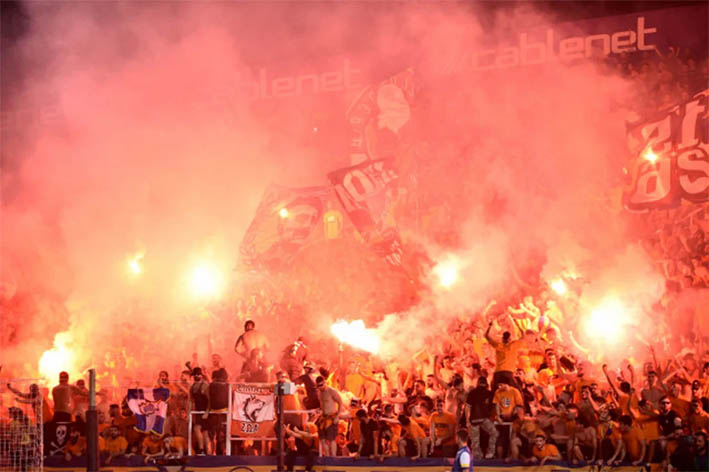The new stadium safety bill will “give the key to safer stadiums to the state”, Justice Minister Marios Hartsiotis said on Wednesday.
Addressing the day’s House legal affairs committee meeting, he said the government’s aim is for “young and old to be able to watch safely”.
He then departed to attend the day’s cabinet meeting, with those remaining going on to discuss the bill’s provisions, and more in-depth discussions on the matter to take place next week.
Data protection commissioner Irene Loizidou Nicolaidou told the committee that the suggestions she had made to the government “have been taken into account”, while legal service representative Charis Karaolidou said the service “has studied the amendments and believes the bill can proceed”.
Not everyone was satisfied, however, with a representative from the stadium licencing authority saying the article which stipulates that all stadiums and indoor arenas with a capacity of over 500 people will be required to install modern camera surveillance systems within a year of the bill’s passing into law “will cause many problems”.
At present, such CCTV systems are only required at venues with capacities of 2,000 spectators or more.
Akel MP Andreas Pasiourtides then intervened, saying that “the legislation’s philosophy is that CCTV be installed regardless of capacity”, and that “this cannot be adjusted at will”.
Then, a representative from the deputy research ministry told the committee that the technical implementation of the new digital fan card “has been implemented”.
However, a bar association representative then expressed fears regarding the provision in the bill which would allow the police to breathalyse and drug test people at and near football matches.
The representative raised concerns with the wording of the bill, which at present states that testing can be carried out “in an area adjacent to the stadium or on the way to the stadium”.
GSP athletics club general manager Phivos Constantinides then argued that “the infrastructure of most stadiums is lagging behind and cannot accept technological upgrades or support the conduct of inspections”.
“I believe that the stadiums cannot respond, the resources are not there. If the state does not decide to undertake the task of improving the stadiums, the law will not be able to be implemented,” he said.
He added that given the fact that people under the age of 14 years old are not required to obtain fan cards, there is “an accumulation of people at entrances who enter without fan cards at many matches”.
As such, he called for the fan card to be rolled out for people of all ages.
On this matter, a representative from the Cyprus sports organisation (Koa) said that fan cards should be checked before match tickets are checked, rather than the inverse.
Then, Cyprus footballers’ association (Pasp) chairman Spyros Neofitides said that the bill in its current form “includes some generalities and vague statements regarding technical specifications” which “do not satisfy” Pasp.
Football clubs themselves were then allowed to have their say, with a representative from Aek Larnaca saying the club is “ready to implement any measures that are decided”.
Meanwhile, the Anorthosis representative asked if there are “specifications for the places” where alcohol and drug tests will be carried out.
In Hartsiotis’ absence, a justice ministry representative said that the “practical implementation” of such tests is “left to the police, who have the experience and equipment”.
Ethnikos Achna chairman Kikis Philippou pointed out that his club’s stadium is located on the British base of Dhekelia, and as such asked whether an agreement for the bill’s implementation has been agreed with the bases’ police.
He also said that “only three stadiums can implement the measures” foreseen in the bill as it stands and therefore called for “state intervention to implement the laws”.
Then, the representative from Omonia 29M expressed concern about the “area adjacent to the stadium” as foreseen in the article regarding drug and alcohol tests, and “the fact that it will be at the discretion of the police to decide who is a dangerous fan”.
This, he said, “affects people’s freedoms”.
He also said it is “not reasonable for non-owners of stadiums to cover the costs of upgrades” and added that “fans are missing from this discussion”.
When it was the MPs’ turn to speak, Akel’s Aristos Damianou was quick to stress that “the legislation as it stands is not applied in its entirety”, and therefore asked whether it is possible for laws to be applied if they are made stricter.
He also asked how many police officers would be available to implement the measures as foreseen in the bill, especially if multiple high-profile matches were going on around the island at the same time.
Committee chairman and Disy MP Nicos Tornaritis said there are “many starting points and ending points which are not connected to each other”.
He added that Hartsiotis “should be present throughout” next week’s meeting.






Click here to change your cookie preferences